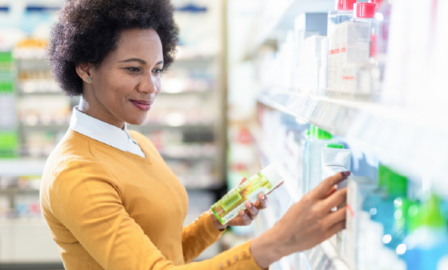Considerations for Implementing LIMS in the Cosmetics Industry
An integrated laboratory information management system (LIMS) can be leveraged to manage laboratory processes, quality control, quality assurance, training, equipment control, and to gather and report data. While every industry will start and finish the process in the testing lab, based on the product that is being analyzed, the needs of the testing labs can be defined into different categories. Thus, it is essential to make sure your company chooses the LIMS software best suited for your specific need. Many LIMS vendors offer industry-specific solutions. Here we explore considerations for LIMS in the cosmetics industry.
Quality and Sustainability: LIMS in the Cosmetics Industry
Today, consumers are living in a world of increasing awareness of what they eat and the products they choose – particularly personal care products within the beauty industry, from skincare to shampoo to cosmetics. The industry today is generating billions within the U.S. all over the world, and beauty products and services continue to thrive.
This consumer awareness has generated a growing focus on quality. Consumers are less worried about price than product effectiveness and quality ingredients. Today, fewer and fewer consumers are accepting just “good enough” and are instead looking for the best and most effective in the market, which creates competitiveness for the producers and retailers. Consumers demand beauty products that are naturally derived and increasingly seek out brands that combat environmental crises. As a result, retailers are more focused on ensuring and advertising the quality of their products versus their competitors.
For companies in the cosmetic industry, this means that following cosmetics regulations – and taking steps toward greater product transparency – should be a core value and business priority. From sourcing the best materials, to packaging and filling, to labeling and quality control, it’s essential that the beauty industry keeps the consumers’ needs and safety top of mind. Is the product safe? Has it been tested properly? Are we able to effectively track the status of the product from start to finish? What claims are we making about its sustainability or efficacy and how is this being managed?
LIMS helps beauty brands producers ensure consumer safety and maintain their reputation by managing quality assurance data through every step of the production process. Many processes can be managed in LIMS, such as formulation and development of products, safety testing of products, preservative efficacy testing (PET), process engineering improvement, microbiology testing, substantiation of compatibility and efficacy claims, allergy testing, contaminate testing, and more. With quality and sustainability in mind, let’s take a closer look at LIMS software specifically designed for the cosmetics industry and the major considerations when implementing a solution.
Considerations for Implementing a LIMS Solution for Cosmetics
Flexibility and Formulation Management
Since today’s beauty industry is more consumer-forward and becomes customizable based on each consumer’s requirements, one of the keys for the LIMS software is to be flexible to custom development and formulation in cosmetics manufacturing. It’s necessary to have the formulation process controlled in regulated industries, and it’s mandatory to have a system that documents all the stages of the formulations: development, testing, and approval. With LIMS, custom workflows specific to activities can be created, new lines of testing can be added, and custom workflow templates can be designed and saved to start new jobs.
Traceability and Transparency
Optimized traceability and transparency in the cosmetics sector are more than just a trend: they’re essential. Brands that are committed to traceability and transparency offer visibility into their production process, sourcing control (vegan, sustainable ingredients, etc.), demand for products with controlled environmental and social impact, and sharing of resources. Consumers like to know where their products come from, the exact ingredients in those products, who produced them, and more. With LIMS software, you can track the production of your skin cream from harvesting the plant in France to packaging in the USA.
Tracking and Storage
LIMS software provides a customizable storage location and tracking module that helps to trace and manage the location of samples, products, and inventories. With this solution, you can track client samples and gather them on jobs, see what work has been completed, and know what remains during each step of the project – and be able to conveniently store and access that data when needed.
Management and Reporting
With today’s LIMS software, it’s easy to manage all tasks in a centralized database, from invoice template creation to generating an automatic notification on sample receipt. Additionally, some LIMS vendors have a web client portal, which means an easy and seamless communication channel between producer and customer.
Multi-language Interface
In a global world and with a willingness to expand business, it may be necessary that your LIMS talk in different languages: either with the client or with different labs across the world. If you decide to sell your brand in other countries, your products will be accessible to all – every consumer that would like to know more about the product can find the details, and every lab that you want to send your test will accept it. The practice of quality control and organizational management from different countries working as a team to create one product is a critical consideration.
Labeling
A LIMS software can be connected to various types of barcode printers and readers that help with labeling for products. From the first step to the last, the system can help with creation of barcodes for each sample/test, including getting ingredients and creating a final label with all necessary details for the customer.
Scheduling
LIMS software deploys data entered during sample login to facilitate accurate analytical scheduling. This is key for helping to monitor work times and assign steps to users. It also helps to provide end shipping dates to the customer, ensuring a seamless product journey.
Good Manufacturing Practice (GMP) Environment
Today’s cosmetics are increasingly targeting not only beauty, but also beauty treatments. This means it’s necessary to implement GMP standards such as documentation and records, equipment, reagents and standards, personnel, and product complaints. GMP isn’t only about safety and contamination, it’s also about product integrity and the ability to control and manage all the factors that influence the quality of a finished product. LIMS can help facilitate GMP practices that ultimately result in a happy customer and continued brand loyalty.
Shelf-Life Stability
It is required to keep track of a product’s quality during their shelf-life. LIMS software helps with tracking, sending automated reminders, and sending client reports during this period, ensuring that product quality is maintained, and regulatory compliance is achieved.
Selecting the Right Solution for your Business Needs
Our team at Clarkston Consulting has experience working with and implementing a variety of LIMS applications and can help your company identify the right solutions and systems for your business needs.
Subscribe to Clarkston's Insights
Contributions by Katya Berd



